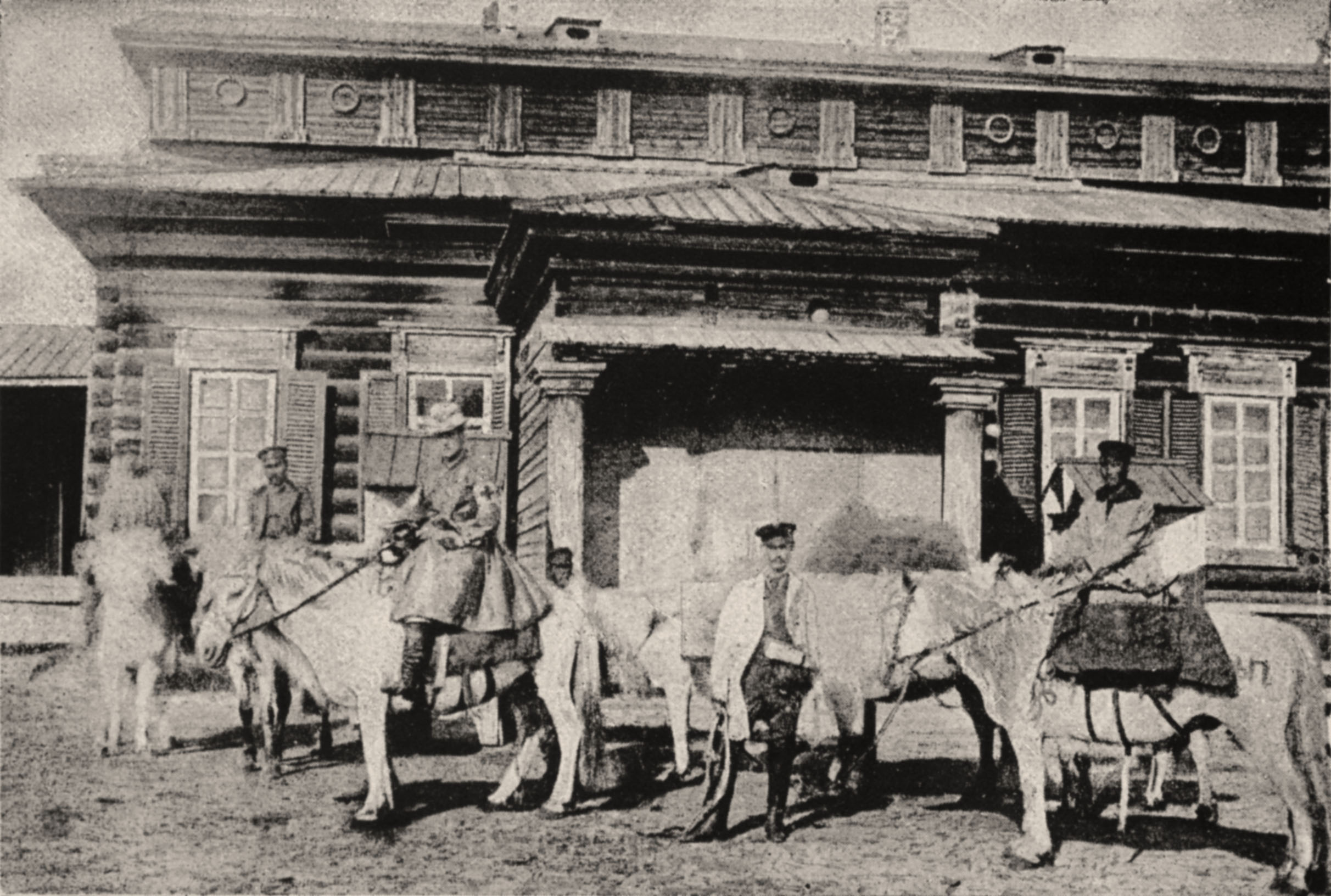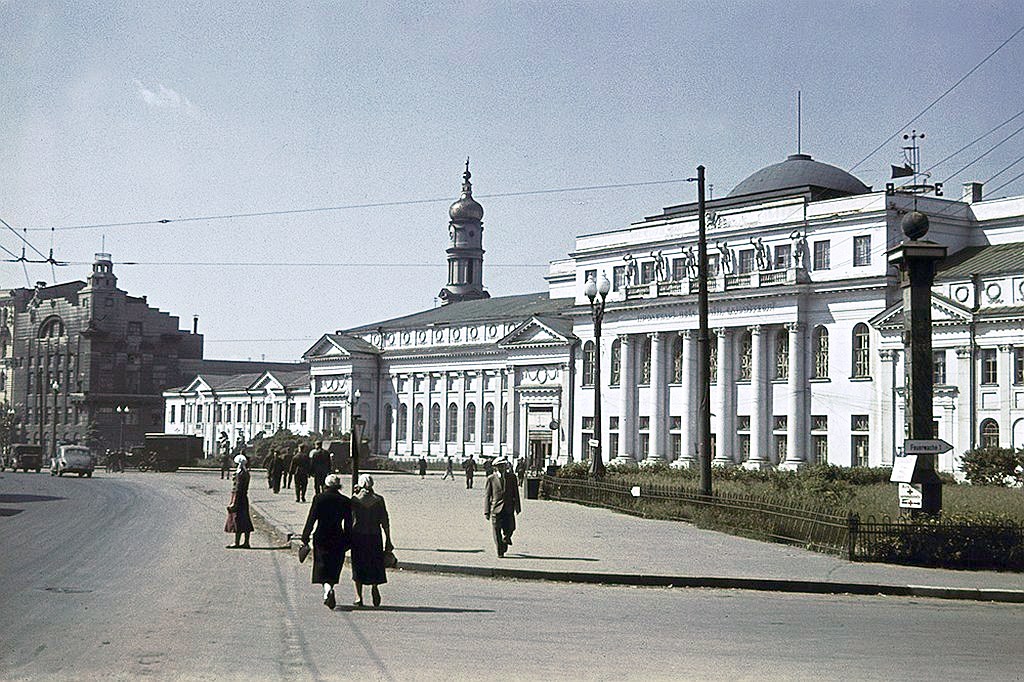|
Vasiliy Averin
Vasiliy Kuzmich Averin (russian: Васи́лий Кузьмич Аве́рин; 1884 – 28 December 1945) was a Russian Bolshevik revolutionary, a leading member of the Cheka and a member of the Soviet government in Ukraine. Biography Averin was born in 1884 or 1885 near Rognedino in the Roslavlsky Uyezd of the Smolensk Governorate of the Russian Empire (today Rognedinsky District, Bryansk Oblast, Russia) in a poor peasant family. In 1903 he joined the Russian Social Democratic Labour Party and in 1904 sided with Bolsheviks. Averin was uneducated and worked as a mechanic. Averin began his revolutionary career in Ekaterinoslav, where in October 1905 he headed a factory committee of the RSDLP. During World War I in 1915 Averin was arrested and exiled to the Irkutsk Governorate. He was released in April 1917 on amnesty due to the February Revolution in Russia and returned to Ekaterinoslav. Averin was a member of the All-Russian Congress of Soviets, the All-Russian Central Executive ... [...More Info...] [...Related Items...] OR: [Wikipedia] [Google] [Baidu] |
Bolsheviks
The Bolsheviks (russian: Большевики́, from большинство́ ''bol'shinstvó'', 'majority'),; derived from ''bol'shinstvó'' (большинство́), "majority", literally meaning "one of the majority". also known in English as the Bolshevists,. It signifies both Bolsheviks and adherents of Bolshevik policies. were a far-left, revolutionary Marxist faction founded by Vladimir Lenin that split with the Mensheviks from the Marxist Russian Social Democratic Labour Party (RSDLP), a revolutionary socialist political party formed in 1898, at its Second Party Congress in 1903. After forming their own party in 1912, the Bolsheviks took power during the October Revolution in the Russian Republic in November 1917, overthrowing the Provisional Government of Alexander Kerensky, and became the only ruling party in the subsequent Soviet Russia and later the Soviet Union. They considered themselves the leaders of the revolutionary proletariat of Russia. Their beli ... [...More Info...] [...Related Items...] OR: [Wikipedia] [Google] [Baidu] |
Russian Constituent Assembly
The All Russian Constituent Assembly (Всероссийское Учредительное собрание, Vserossiyskoye Uchreditelnoye sobraniye) was a constituent assembly convened in Russia after the October Revolution of 1917. It met for 13 hours, from 4 p.m. to 5 a.m., , whereupon it was dissolved by the All-Russian Central Executive Committee, making the Third All-Russian Congress of Soviets the new governing body of Russia. Origins A democratically elected Constituent Assembly to create a Russian constitution was one of the main demands of all Russian revolutionary parties prior to the Russian Revolution of 1905. In 1906, the Tsar decided to grant basic civil liberties and hold elections for a newly created legislative body, the State Duma. However, the Duma was never authorized to write a new constitution, much less abolish the monarchy. Moreover, the Duma's powers were falling into the hands of the Constitutional Democrats and not the Marxist Socialists. The govern ... [...More Info...] [...Related Items...] OR: [Wikipedia] [Google] [Baidu] |
1945 Deaths
1945 marked the end of World War II and the fall of Nazi Germany and the Empire of Japan. It is also the only year in which Nuclear weapon, nuclear weapons Atomic bombings of Hiroshima and Nagasaki, have been used in combat. Events Below, the events of World War II have the "WWII" prefix. January * January 1 – WWII: ** Nazi Germany, Germany begins Operation Bodenplatte, an attempt by the ''Luftwaffe'' to cripple Allies of World War II, Allied air forces in the Low Countries. ** Chenogne massacre: German prisoners are allegedly killed by American forces near the village of Chenogne, Belgium. * January 6 – WWII: A German offensive recaptures Esztergom, Kingdom of Hungary (1920–1946), Hungary from the Russians. * January 12 – WWII: The Soviet Union begins the Vistula–Oder Offensive in Eastern Europe, against the German Army (Wehrmacht), German Army. * January 13 – WWII: The Soviet Union begins the East Prussian Offensive, to eliminate German forces in East Pruss ... [...More Info...] [...Related Items...] OR: [Wikipedia] [Google] [Baidu] |
1880s Births
Year 188 (CLXXXVIII) was a leap year starting on Monday of the Julian calendar. At the time, it was known in the Roman Empire as the Year of the Consulship of Fuscianus and Silanus (or, less frequently, year 941 ''Ab urbe condita''). The denomination 188 for this year has been used since the early medieval period, when the Anno Domini calendar era became the prevalent method in Europe for naming years. Events By place Roman Empire * Publius Helvius Pertinax becomes pro-consul of Africa from 188 to 189. Japan * Queen Himiko (or Shingi Waō) begins her reign in Japan (until 248). Births * April 4 – Caracalla (or Antoninus), Roman emperor (d. 217) * Lu Ji (or Gongji), Chinese official and politician (d. 219) * Sun Shao, Chinese general of the Eastern Wu state (d. 241) Deaths * March 17 – Julian, pope and patriarch of Alexandria * Fa Zhen (or Gaoqing), Chinese scholar (b. AD 100) * Lucius Antistius Burrus, Roman politician (executed) * Ma Xiang, Chin ... [...More Info...] [...Related Items...] OR: [Wikipedia] [Google] [Baidu] |
Yakut ASSR
The Yakut Autonomous Soviet Socialist Republic (russian: Якутская Автономная Советская Социалистическая Республика, ''Yakutskaya Avtonomnaya Sovetskaya Sotsialisticheskaya Respublika''; sah, Саха автономнай сэбиэскэй социалистическэй республиката, ''Sakha avtonomnay sebieskey sotsialistichyeskey ryespublikata''), Soviet Yakutia, or the Yakut ASSR (, ''Yakutskaya ASSR''), was an autonomous republic of the Russian SFSR within the Soviet Union. History It was created on April 27 1922, during the Yakut revolt, and was transformed into the Sakha Republic Sakha, officially the Republic of Sakha (Yakutia),, is the largest republic of Russia, located in the Russian Far East, along the Arctic Ocean, with a population of roughly 1 million. Sakha comprises half of the area of its governing Far Eas ... in 1991. See also * First Secretary of the Yakut Communist Party Notes Ref ... [...More Info...] [...Related Items...] OR: [Wikipedia] [Google] [Baidu] |
World War II
World War II or the Second World War, often abbreviated as WWII or WW2, was a world war that lasted from 1939 to 1945. It involved the vast majority of the world's countries—including all of the great powers—forming two opposing military alliances: the Allies and the Axis powers. World War II was a total war that directly involved more than 100 million personnel from more than 30 countries. The major participants in the war threw their entire economic, industrial, and scientific capabilities behind the war effort, blurring the distinction between civilian and military resources. Aircraft played a major role in the conflict, enabling the strategic bombing of population centres and deploying the only two nuclear weapons ever used in war. World War II was by far the deadliest conflict in human history; it resulted in 70 to 85 million fatalities, mostly among civilians. Tens of millions died due to genocides (including the Holocaust), starvation, ma ... [...More Info...] [...Related Items...] OR: [Wikipedia] [Google] [Baidu] |
Yakutsk
Yakutsk (russian: Якутск, p=jɪˈkutsk; sah, Дьокуускай, translit=Djokuuskay, ) is the capital city of the Sakha Republic, Russia, located about south of the Arctic Circle. Fueled by the mining industry, Yakutsk has become one of Russia's most rapidly growing regional cities, with a population of 355,443 at the 2021 Census. Yakutsk — where the average annual temperature is , winter high temperatures are consistently well below , and the record low is ,Погода в Якутске. Температура воздуха и осадки. Июль 2001 г. (in Russian) — is the coldest city in the world. Yakutsk is also the largest city located in |
Central Executive Committee Of The Soviet Union
The All-Union Central Executive Committee (russian: Всесоюзный Центральный исполнительный комитет, Vsesoyuznyy Tsentral'nyy ispolnitel'nyy komitet) was the most authoritative governing body of the USSR during the interims of the sessions of the All-Union Congress of Soviets. Established in 1922 by the First All-Union Congress of Soviets (see Treaty on the Creation of the USSR), in 1938 it was replaced by the Presidium of the Supreme Soviet of first convocation. Initially the Committee consisted of four members, after 1925 there were seven. The Kazakh and Kirghiz SSRs were created in 1936 and did not have representatives in the Committee, as it dissolved just two years later. Description The Central Executive Committee was created with adoption of the Treaty on the Creation of the USSR in December of 1922. The Central Executive Committee was elected by the Congress of Soviet to govern on its behalf whenever the Congress of Soviets ... [...More Info...] [...Related Items...] OR: [Wikipedia] [Google] [Baidu] |
Central Executive Committee Of The Ukrainian SSR
All-Ukrainian Central Executive Committee ( uk, italic=yes, Всеукраїнський центральний виконавчий комітет) was a representative body of the All-Ukrainian Congress of Soviets. It was the supreme legislative, administrative, executive controlling state power of Soviet Ukraine (Ukrainian SSR) between the sessions of the Congress of Soviets that acted between 1917 until 1938. In the very beginning this institution was established as the Central Executive Committee of Soviet of Ukraine at the First All-Ukrainian Congress of Soviets in Kharkiv on December 24–25, 1917. At the same congress was elected the People's Secretariat of Ukraine. On March 19, 1919, the committee issued a declaration, in which it passed most of its authority to the Sovnarkom of Ukraine at that time headed by Christian Rakovsky. Historical scope The committee was first elected at the 1st All-Ukrainian Congress of Soviets on December 24, 1917, under the name of TsVK of So ... [...More Info...] [...Related Items...] OR: [Wikipedia] [Google] [Baidu] |
Left Opposition
The Left Opposition was a faction within the Russian Communist Party (b) from 1923 to 1927 headed ''de facto'' by Leon Trotsky. The Left Opposition formed as part of the power struggle within the party leadership that began with the Soviet founder Vladimir Lenin's illness and intensified with his death in January 1924. Originally, the battle lines were drawn between Trotsky and his supporters who signed The Declaration of 46 in October 1923 on the one hand and a triumvirate (also known by its Russian name ''troika'') of Comintern chairman Grigory Zinoviev, Communist Party General Secretary Joseph Stalin and Politburo chairman Lev Kamenev on the other hand. The Left Opposition argued that the New Economic Policy had weakened the Soviet Union by allowing the private sector to achieve an increasingly important position in the Soviet economy while in their opinion, the centrally planned, socialised sector of the economy languished (including the mostly state-run heavy industries wh ... [...More Info...] [...Related Items...] OR: [Wikipedia] [Google] [Baidu] |
Communist Party Of Ukraine (Soviet Union)
The Communist Party of Ukraine ( uk, Комуністична Партія України ''Komunistychna Partiya Ukrayiny'', КПУ, ''KPU''; russian: Коммунистическая партия Украины) was the founding and ruling political party of the Ukrainian Soviet Socialist Republic operated as a republican branch (union republics) of the Communist Party of the Soviet Union (CPSU).Pyrih, R. Communist Party of Ukraine, the Soviet period (КОМУНІСТИЧНА ПАРТІЯ УКРАЇНИ РАДЯНСЬКОЇ ДОБИ)'. Encyclopedia of History of Ukraine. 2007 No decision of the government of Ukraine (Council of Ministers) was adopted without approval of the Central Committee of the Communist Party of Ukraine. The Communist Party of Ukraine is not one and the same party as the Ukrainian Communist Party or Ukrainian Communist Party (Borotbists). Founded as the Communist Party (Bolsheviks) of Ukraine (CP(b)U) in 1918 in Moscow, Russian SFSR, it was the sole g ... [...More Info...] [...Related Items...] OR: [Wikipedia] [Google] [Baidu] |
Mayor Of Odessa ...
Throughout Odesa, Ukraine's history, the office of Novorossiya Governor and Odesa mayor was closely aligned and often was held by the same leader. List of Mayors See also * Timeline of Odesa References {{Reflist, 2 Odesa Odesa (also spelled Odessa) is the third most populous city and municipality in Ukraine and a major seaport and transport hub located in the south-west of the country, on the northwestern shore of the Black Sea. The city is also the administrative ... [...More Info...] [...Related Items...] OR: [Wikipedia] [Google] [Baidu] |






